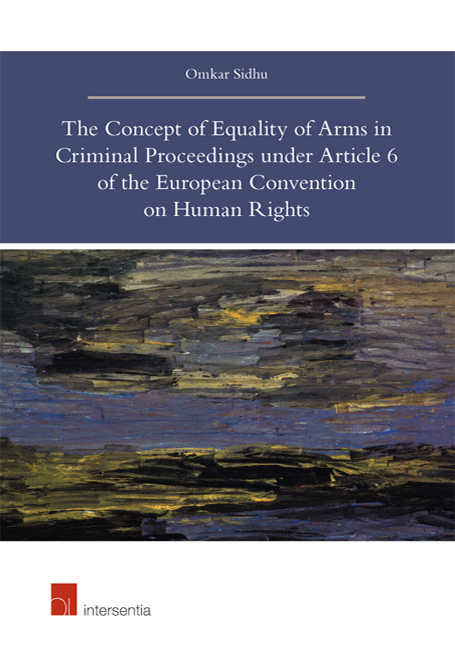Book contents
- Frontmatter
- Contents
- Introduction
- Chapter 1 A Background for Article 6
- Chapter 2 Equality of Arms
- Chapter 3 Equality of Arms and the Right to Challenge and Call Witness Evidence
- Chapter 4 Equality of Arms and the Right to Adequate Time and Facilities
- Chapter 5 Equality of Arms and the Right to Legal Assistance
- Concluding Overview
- Bibliography
- List of Cases
- List of Legislative Instruments
Chapter 2 - Equality of Arms
Published online by Cambridge University Press: 19 September 2018
- Frontmatter
- Contents
- Introduction
- Chapter 1 A Background for Article 6
- Chapter 2 Equality of Arms
- Chapter 3 Equality of Arms and the Right to Challenge and Call Witness Evidence
- Chapter 4 Equality of Arms and the Right to Adequate Time and Facilities
- Chapter 5 Equality of Arms and the Right to Legal Assistance
- Concluding Overview
- Bibliography
- List of Cases
- List of Legislative Instruments
Summary
INTRODUCTION
This chapter approaches equality of arms in criminal proceedings under Article 6 from a predominantly theoretical standpoint. Whilst procedural equality between parties to proceedings appeals to our intuitive sense of procedural fairness, a deeper exploration of its actual value is deserved. Section 2 reveals its two principal values, accompanied with an assessment of which of these has theoretical primacy, and reveals its secondary, collateral value. In order for the value of procedural equality to manifest itself practically, such equality must first be given effect in law. Section 3 identifies a contemporary legal foundation for equality of arms in Article 6 and in international law. The legal obligation assumed in criminal proceedings under the concept of equality of arms in Article 6 has been enunciated recurrently as requiring that ‘each party must be afforded a reasonable opportunity to present his case under conditions that do not place him at a disadvantage vis-a-vis his opponent’. Section 4 defines each essential element of this formula to elucidate in detail the nature of the concept, before its application is assessed critically in the chapters hereafter.
THE VALUE OF PROCEDURAL EQUALITY
The value of procedural equality in its modern form is multi-faceted. It has two principal values – it contributes to attaining a correct trial outcome and it reflects respect for the dignity of the individual – as well as a secondary value as a component of securing some form of good governance. The latter is referred to as a secondary value because it is a collateral consequence of the principal values being present.
CORRECT TRIAL OUTCOME
A correct trial outcome entails that the defendant should be found guilty if he has undoubtedly committed the offence as charged and that the innocent should not be wrongfully convicted. It requires that the judgement of the court is accurate and reliable in its finding of facts on the evidence and in its application of the law to those facts. Procedural rights and principles facilitate the communicative engagement of the parties with the decision-maker as to facts, evidence and law, consequently influencing the trial outcome. Procedural equality has an instrumental value in rendering more probable the achievement of a correct trial outcome.
- Type
- Chapter
- Information
- The Concept of Equality of Arms in Criminal Proceedings under Article 6 of the European Convention on Human Rights , pp. 75 - 116Publisher: IntersentiaPrint publication year: 2017



